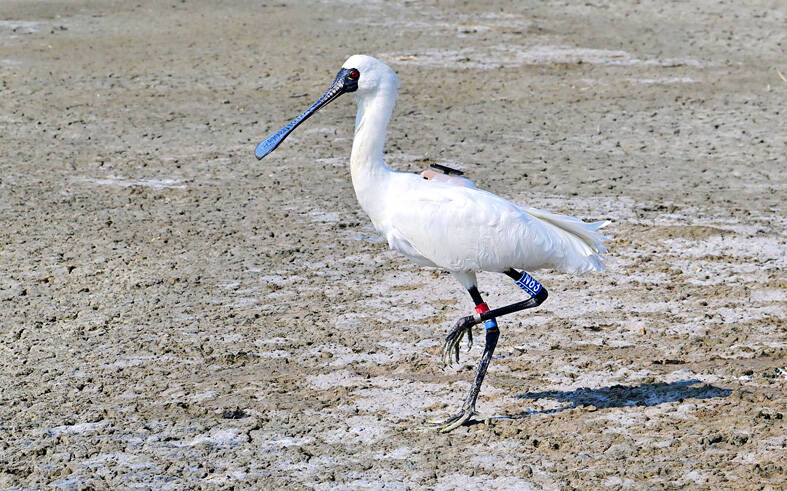A black-faced spoonbill that was rehabilitated in Taiwan in January returned to the country last month by “hitching a ride” on Typhoon Krathon, which propelled it across the Taiwan Strait at speeds reaching 85kph, conservationists said.
Tainan Wild Bird Society executive director Kuo Tung-hui (郭東輝) on Sunday said the bird, given the name “N83,” was found in January with botulism-induced paralysis in a fish pond in Tainan.
After receiving treatment, N83 was fitted with a tracking device and released with several other rehabilitated spoonbills, Kuo said.

Photo courtesy of Kuo Tung-hui
N83 was then monitored via satellite by the Bird Ecology Lab at National Pingtung University of Science and Technology.
The lab’s GPS data showed N83 reached China on March 21, continued north and arrived in the spoonbills’ breeding area on the Korean Peninsula on April 10.
It flew south as winter approached, arriving on the southeast coast of China on Sept. 29.
N83 returned to Taiwan on Oct. 3 by “hitching a ride” on winds from Typhoon Krathon, the bird lab said.
Krathon initially moved west through the Bashi Channel, before turning north toward Kaohsiung.
N83 was crossing the Taiwan Strait at the time and propelled by the typhoon’s winds to speeds reaching 85kph as it made its way toward Kaohsiung, the lab said.
Local birdwatchers reported sightings of N83 in Chiayi early last month and Tainan on Oct. 30.

Costa Rica sent a group of intelligence officials to Taiwan for a short-term training program, the first time the Central American country has done so since the countries ended official diplomatic relations in 2007, a Costa Rican media outlet reported last week. Five officials from the Costa Rican Directorate of Intelligence and Security last month spent 23 days in Taipei undergoing a series of training sessions focused on national security, La Nacion reported on Friday, quoting unnamed sources. The Costa Rican government has not confirmed the report. The Chinese embassy in Costa Rica protested the news, saying in a statement issued the same

Temperatures in New Taipei City’s Sindian District (新店) climbed past 37°C yesterday, as the Central Weather Administration (CWA) issued heat alerts for 16 municipalities, warning the public of intense heat expected across Taiwan. The hottest location in Taiwan was in Sindian, where the mercury reached 37.5°C at about 2pm, according to CWA data. Taipei’s Shilin District (士林) recorded a temperature of 37.4°C at noon, Taitung County’s Jinfeng Township (金峰) at 12:50 pm logged a temperature of 37.4°C and Miaoli County’s Toufen Township (頭份) reached 36.7°C at 11:40am, the CWA said. The weather agency yesterday issued a yellow level information notice for Taipei, New

Taiwan’s Liu Ming-i, right, who also goes by the name Ray Liu, poses with a Chinese Taipei flag after winning the gold medal in the men’s physique 170cm competition at the International Fitness and Bodybuilding Federation Asian Championship in Ajman, United Arab Emirates, yesterday.

CASE: Prosecutors have requested heavy sentences, citing a lack of remorse and the defendants’ role in ‘undermining the country’s democratic foundations’ Five people affiliated with the Chinese Nationalist Party (KMT), including senior staff from the party’s Taipei branch, were indicted yesterday for allegedly forging thousands of signatures to recall two Democratic Progressive Party (DPP) lawmakers. Those indicted include KMT Taipei chapter director Huang Lu Chin-ru (黃呂錦茹), secretary-general Chu Wen-ching (初文卿) and secretary Yao Fu-wen (姚富文), the Taipei District Prosecutors’ Office said in a news release. Prosecutors said the three were responsible for fabricating 5,211 signature forms — 2,537 related to the recall of DPP Legislator Wu Pei-yi (吳沛憶) and 2,674 for DPP Legislator Rosalia Wu (吳思瑤) — with forged entries accounting for